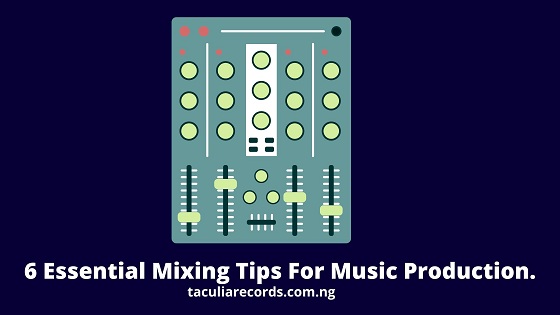In this article, I will show you the 6 essential mixing tips for music production that will help you get the perfect-sounding music out there.
And without much ado, let’s begin by looking at the meaning of mixing in music production.
What is mixing in music production?
Mixing in music production is the process of blending recorded instruments and vocals together. And this is done by using various processes such as EQ, Compression, and Reverb.
The aim of mixing in music production is to bring out the best in your multi-track recording by adjusting levels, panning, and time-based audio effects (chorus, reverb, delay).
6 essential mixing tips for music production.
The 6 essential mixing tips for music production are:
- Use hi-pass and low-pass filters.
- Automate everything.
- Pan your instruments and vocals.
- Take breaks
- Complete all your edits first.
- Experiment.
1. Use hi-pass and low-pass filters.
To get a less cluttered mix, make sure you use a hi-pass and low-pass filter better to define the range of each of your instruments.
You can try the BX CLEANSWEEP plugin or any other EQ plugin that you know.
2. Automate everything.
With the powerful automation functions available in your DAW, there is no level for you to be “just good enough” for the whole song.
Therefore, try to fine-tune balances for every section, phrase, or syllable if you have to.
The same will also go for sends and effects.
3. Pan your instruments and vocals.
Nearly every element of the song can be assigned to one of those 3 panning positions which are hard left, right, and center.
Therefore, don’t fret about finding the perfect pan position for every instrument, or try to make it completely life-like.
Anything other than hard left, right, and center will translate everything on every system.
You can save those in between positions for a few selected elements.
4. Take breaks.
Always take breaks to rest your ears and reset your perspective.
Mixing music is hard work, and for that reason every couple of minutes you have to stop, relax and refresh your body.
Interruptions and distractions will not count as breaks as well.
5. Complete all your edits first.
Drum editing, vocal comping, and tuning pocketing bass to kick drum.
These things should be taken care of before the mix stage otherwise you will not be able to develop and maintain the flow of the mix.
6. Experiment.
Skip the presets and what seemed to have worked last time. Take things to the extreme, make things distort, and use guitar effects for vocals.
Try out all your tools and see what makes them break. Just have fun with it.
On your way, you will find some unique sounds that can only be found by avoiding the presets.
Good luck!




